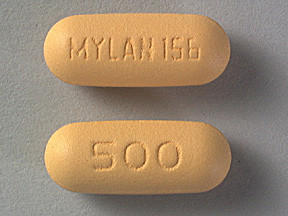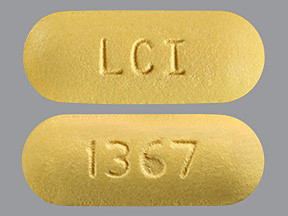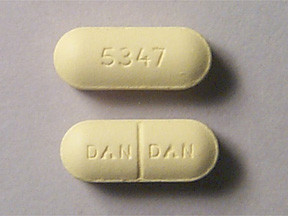PROBENECID - ORAL
PHONETIC PRONUNCIATION: (proe-BEN-e-sid)
COMMON BRAND NAME(S): Benemid
GENERIC NAME(S): probenecid
Uses
USES: This medication is used to prevent gout and gouty arthritis. It will not treat a sudden/severe attack of gout and may make it worse. Probenecid belongs to a class of drugs known as uricosurics. It lowers high levels of uric acid in your body by helping the kidneys to get rid of uric acid. When uric acid levels get too high, crystals can form in the joints, causing gout. Lowering uric acid levels may also help your kidneys. Probenecid may be prescribed in combination with certain antibiotics (such as penicillins). It increases the levels of antibiotic in the blood, which helps the antibiotic work better. Probenecid should not be used in children younger than 2 years.
How to use PROBENECID - ORAL
HOW TO USE: To prevent gout, take this medication by mouth, usually twice daily with food or antacids to reduce stomach upset or as directed by your doctor. It is best to drink a full glass of water with each dose and at least another 8 glasses (8 ounces each) a day while taking this drug in order to prevent kidney stones. If you are on restricted fluid intake, consult your doctor for further instructions. Your doctor may also instruct you on how to decrease acidity in your urine (e.g., avoid large amounts of ascorbic acid/vitamin C) to prevent kidney stones. Your doctor may order other medications (e.g., sodium bicarbonate, citrate) to make your urine less acidic. Dosage is based on your condition and response to therapy. Your doctor may direct you to take a low dose at first, then adjust your dose based on uric acid levels and your gout symptoms. After you have been symptom-free for several months and your uric acid levels are normal, your doctor may lower your probenecid dose to the lowest effective dose. Follow your doctor's directions carefully. Probenecid should not be started during a sudden/severe gout attack. Wait until your current attack is over before starting this medication. You may experience an increase in the number of gout attacks for several months after starting this medicine while the body removes extra uric acid. If you have a gout attack while taking probenecid, continue taking it along with your medications for gout pain. Probenecid is not a pain reliever. To relieve pain from gout, continue to take your medicines prescribed for pain from gout attacks (e.g., colchicine, ibuprofen, indomethacin) as directed by your doctor. If you are taking this medication to raise the level of antibiotics in your body, follow your doctor's directions for when to take the antibiotic and when to take the probenecid. Use this medication regularly to get the most benefit from it. To help you remember, take it at the same times each day. Inform your doctor if your condition persists or worsens.
Side Effects
Precautions
Interactions
Overdose
Images
Reviews
Faq for PROBENECID - ORAL
Probenecid is an oral medication that belongs to a class of drugs known as uricosurics. It is used in the treatment of gout and certain types of kidney stones.
Probenecid works by increasing the removal of uric acid from the body through the kidneys, thereby reducing the levels of uric acid in the blood.
Probenecid is primarily used for the treatment of gout, a type of arthritis caused by the buildup of uric acid crystals in the joints. It can also be used to prevent certain types of kidney stones and enhance the effectiveness of certain antibiotics.
Probenecid is usually taken orally with food, and the dosage and frequency will depend on your specific condition. It is important to follow the instructions provided by your healthcare provider or read the medication guide carefully.
Common side effects of Probenecid may include stomach upset, headache, dizziness, nausea, rash, and increased uric acid levels. If you experience any severe or persistent side effects, it is important to contact your doctor.
Yes, Probenecid can interact with certain medications, including antibiotics, anticoagulants, and nonsteroidal anti-inflammatory drugs (NSAIDs). It is important to inform your healthcare provider about all the medications you are taking to avoid any potential interactions.
Probenecid is generally not recommended during pregnancy unless the potential benefits outweigh the risks. It may not be safe to use Probenecid while breastfeeding, as it can pass into breast milk. Consult your doctor for personalized advice.
The effectiveness of Probenecid varies from person to person. It may take several weeks of regular use for the medication to effectively lower uric acid levels and relieve gout symptoms. Follow your doctor's instructions and be patient.
It is important not to stop taking Probenecid without consulting your doctor, even if your symptoms improve. Stopping the medication abruptly can lead to a sudden increase in uric acid levels and a gout attack. Follow your doctor's guidance for the duration of treatment.
Disclaimer
IMPORTANT: HOW TO USE THIS INFORMATION: This is a summary and does NOT have all possible information about this product. This information does not assure that this product is safe, effective, or appropriate for you. This information is not individual medical advice and does not substitute for the advice of your health care professional. Always ask your health care professional for complete information about this product and your specific health needs.



No Reviews Yet